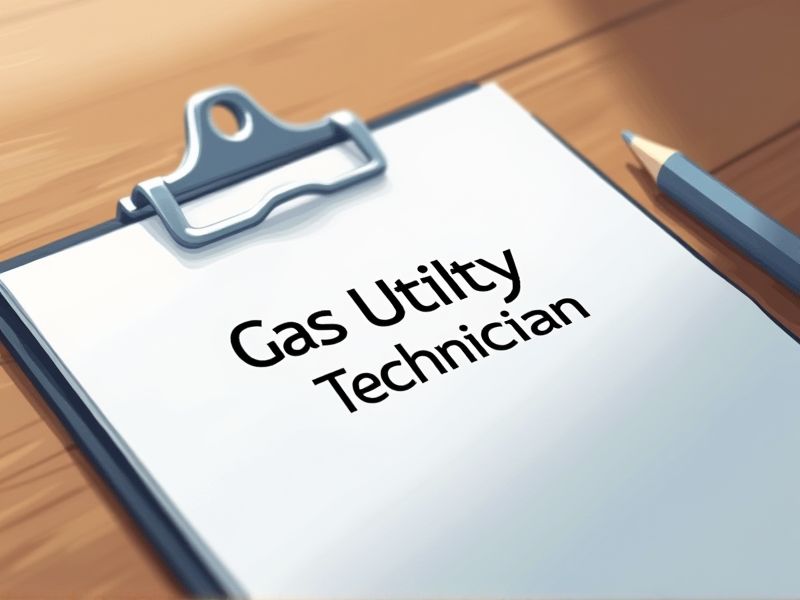
Gas Utility Technicians handle hazardous materials and complex systems, making safety an absolute priority in their role. Certifications provide them with the skills and knowledge essential to comply with industry regulations and safety standards. Employers often require these credentials to ensure technicians are well-prepared to mitigate risks and maintain efficient operations. Key certifications you may need for a career as a Gas Utility Technician include the following.
OSHA 10-Hour Safety Certification
Gas utility technicians work in environments with potential hazards such as gas leaks and high-pressure systems; OSHA 10-Hour Safety Certification provides them with essential safety knowledge to mitigate these risks. The certification helps technicians recognize and address workplace safety violations, reducing accident rates. Employers gain confidence that certified workers can comply with federal safety regulations, improving overall operational reliability. This credential can enhance a technician's employability by demonstrating their commitment to safety standards and best practices.
OSHA 30-Hour Safety Certification
The OSHA 30-Hour Safety Certification is needed for a Gas Utility Technician because it provides comprehensive training on workplace hazard identification, reducing the risk of accidents. OSHA certification enhances the technician's understanding of federal safety regulations, ensuring compliance and avoiding costly penalties. This training equips technicians with the necessary skills to handle emergencies and mitigate risks associated with gas leaks. Employers often require this certification, as it demonstrates a commitment to maintaining a safe work environment.
Confined Space Entry Certification
Confined Space Entry Certification is crucial because it ensures gas utility technicians understand the potential hazards associated with working in limited spaces, such as exposure to toxic gases. This certification provides the necessary training to follow protocols that prevent accidents, reducing the risk of fatalities and injuries. Regulatory compliance requires technicians to have this certification, as it adheres to safety standards set by organizations like OSHA. Certified technicians are equipped to implement proper safety measures, enhancing overall operational safety within the utility infrastructure.
Hazardous Materials (HAZMAT) Awareness Certification
Gas utility technicians often deal with materials that have the potential to be dangerous, such as natural gas and its byproducts. Acquiring HAZMAT Awareness Certification equips these technicians with the knowledge to identify and respond to hazardous materials effectively, ensuring both personal and public safety. Understanding proper handling and emergency response procedures can prevent accidents and reduce risks associated with gas leaks or spills. This certification supports regulatory compliance, which is critical for maintaining operational standards in the utility industry.
NFPA 54 Compliance Certification
NFPA 54 Compliance Certification ensures that Gas Utility Technicians have expertise in handling and installing natural gas systems safely, minimizing the risk of gas leaks and related hazards. This certification mandates adherence to standardized safety protocols, which significantly reduces the potential for accidents and enhances operational reliability. By mandating NFPA 54 compliance, utility companies can foster trust among consumers regarding the safe delivery and use of gas services. Certification aligns technicians with industry regulations, aiding in legal compliance and reducing potential liabilities for both technicians and employers.
Gas Distribution Pipeline Safety Certification
Gas Distribution Pipeline Safety Certification ensures technicians possess necessary knowledge and skills to prevent hazardous gas leaks. Regulated certification requirements reduce risks of accidents and enhance public and environmental safety. Properly trained technicians contribute to reliable gas supply and operational efficiency. Standardized safety protocols uphold industry best practices and legal compliance.
American Welding Society (AWS) Certification
Gas utility technicians require AWS certification to ensure they possess the necessary welding skills specific to industry standards. Proper certification reduces the risk of pipeline leaks, which can lead to hazardous environmental and safety incidents. Employers trust AWS-certified technicians, knowing their skills have been independently verified and meet critical safety regulations. Certification can open doors to more job opportunities and potentially higher wages, as it validates a technician's expertise.
CPR/First Aid Certification
A gas utility technician often works in environments where emergencies, such as gas leaks or explosions, can occur, making CPR/First Aid certification essential for immediate response. This certification ensures technicians can provide life-saving interventions to colleagues or civilians impacted by such emergencies. Rapid first aid response can significantly reduce injury severity, potentially improving recovery outcomes for victims. Furthermore, possessing this certification may also align with industry regulations and safety standards, enhancing the overall safety performance of the utility company.
National Propane Gas Association (NPGA) Certification
NPGA Certification ensures gas utility technicians possess the necessary knowledge and skills for safely handling propane, reducing risks of accidents and injuries. It provides standardized training, ensuring technicians across the industry meet specific safety and operational benchmarks. Regulatory compliance often requires certified professionals, making NPGA Certification essential for adhering to legal standards. Certification enhances professional credibility and can lead to increased job opportunities and career advancement in the utility sector.
Utility Accident Prevention Certification
Utility Accident Prevention Certification is needed for a Gas Utility Technician because it equips them with safety protocols that minimize the risk of gas leaks and explosions. Proper certification ensures that technicians understand regulatory compliance, reducing legal liabilities for utility companies. Thorough certification programs enhance technicians' ability to rapidly identify and address potential hazards, preventing workplace injuries or fatalities. An emphasis on prevention reduces costly equipment damage and service disruptions, enhancing service reliability.
Summary
By obtaining certifications, you enhance your credibility and become a more attractive candidate for employers. This leads to increased job opportunities and potentially higher salaries in the gas utility sector. Certified technicians often gain a deeper understanding of specialized skills, resulting in improved job performance. Your professional growth accelerates, positioning you for advancement within the industry.
